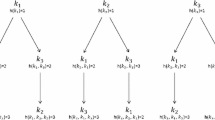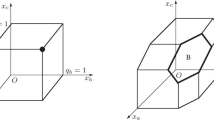Abstract.
We consider a probabilistic approach to the problem of assigning k indivisible identical objects to a set of agents with single-peaked preferences. Using the ordinal extension of preferences we characterize the class of uniform probabilistic rules by Pareto efficiency, strategy-proofness, and no-envy. We also show that in this characterization no-envy cannot be replaced by anonymity. When agents are strictly risk averse von Neumann-Morgenstern utility maximizer, then we reduce the problem of assigning k identical objects to a problem of allocating the amount k of an infinitely divisible commodity.
Similar content being viewed by others
Author information
Authors and Affiliations
Corresponding author
Additional information
Received: 1 January 2002, Accepted: 5 February 2003,
JEL Classification:
D63, D71, D81
Bettina Klaus: B. Klaus is supported by a Ramón y Cajal contract and by Research Grant BEC 2002-02130 from the Spanish Ministerio de Ciencia y Tecnología.
The authors thank William Thomson for many helpful comments.
Rights and permissions
About this article
Cite this article
Ehlers, L., Klaus, B. Probabilistic assignments of identical indivisible objects and uniform probabilistic rules. Review Economic Design 8, 249–268 (2003). https://doi.org/10.1007/s10058-003-0101-3
Issue Date:
DOI: https://doi.org/10.1007/s10058-003-0101-3




